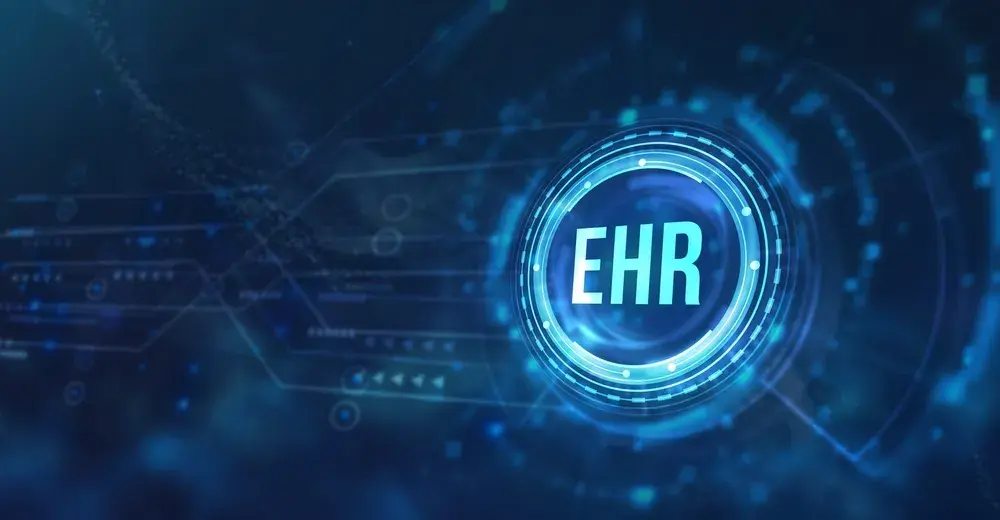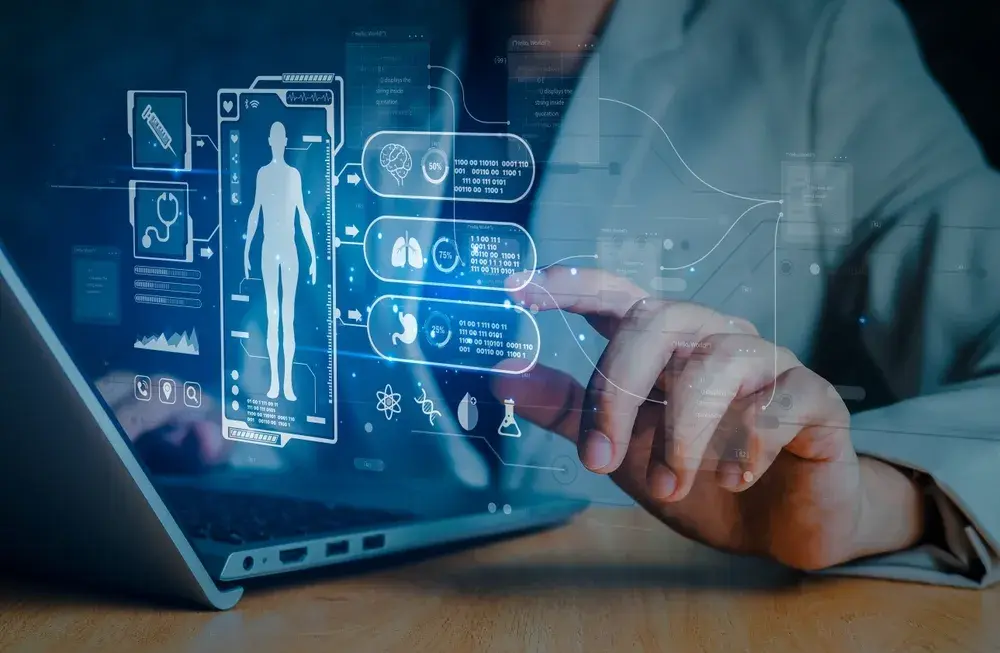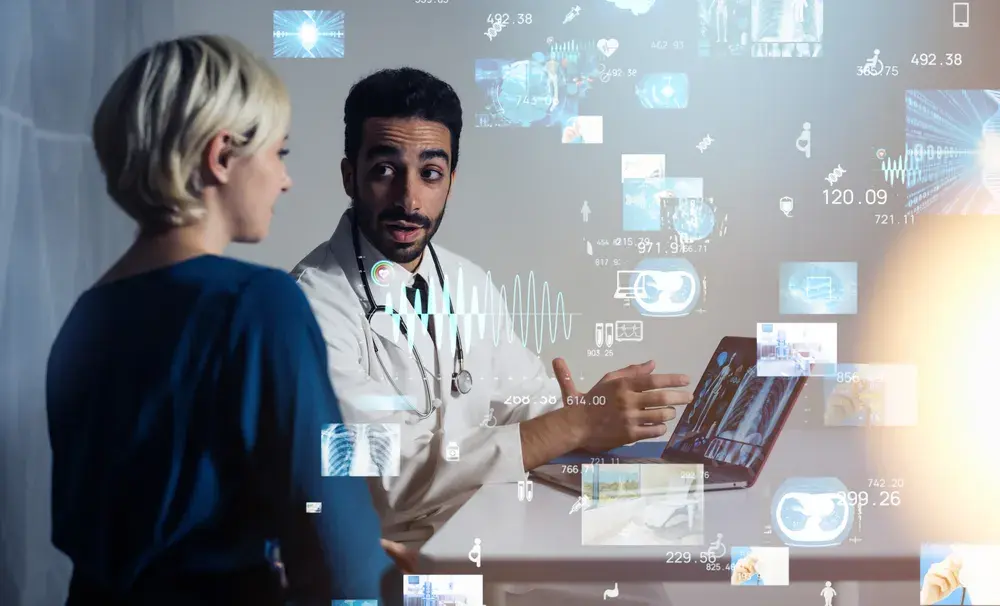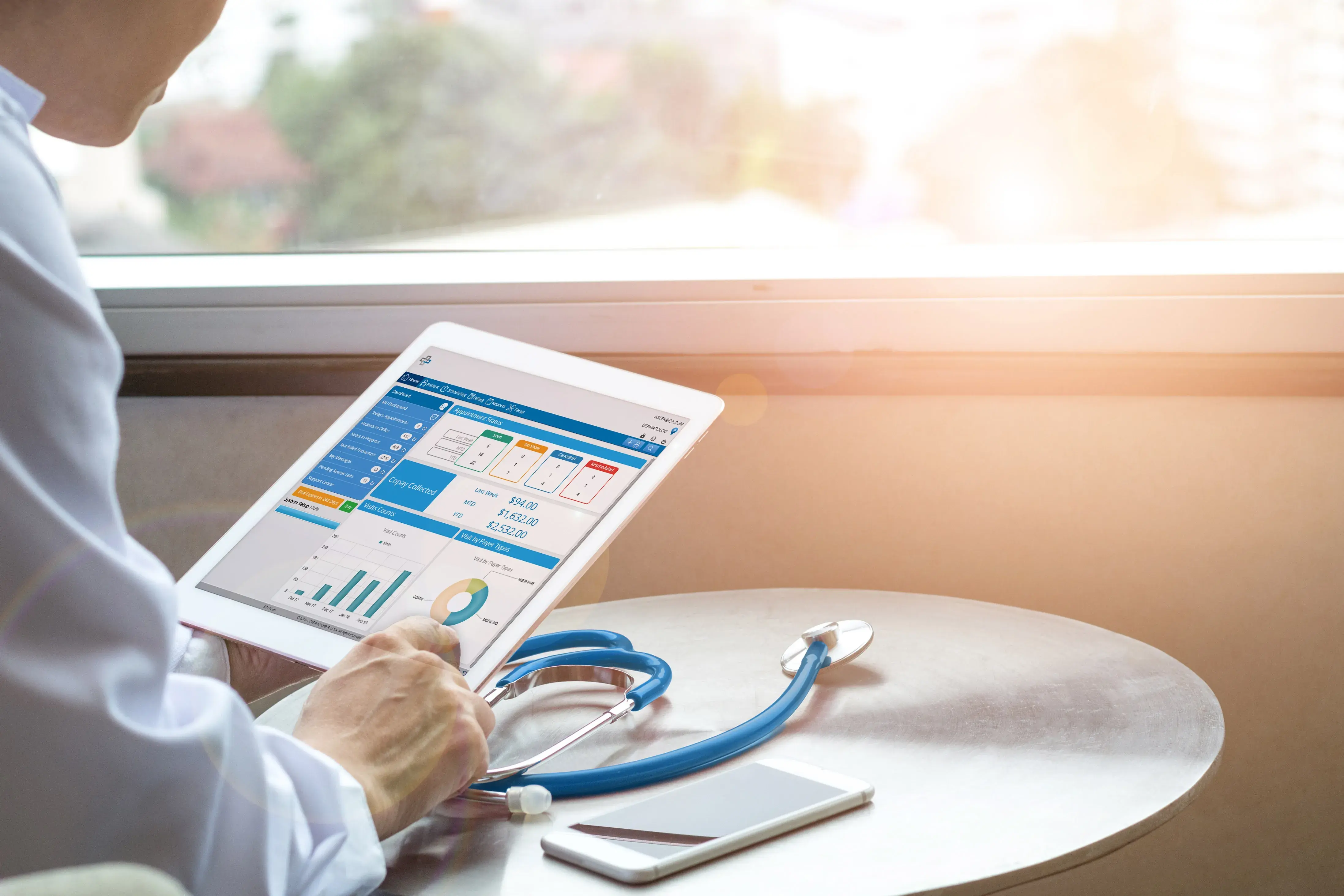Urgent care doesn’t have to mean long waits or crowded clinics. Telemedicine makes care faster, safer, and more accessible, helping providers and patients manage common concerns efficiently.
In recent years, Electronic Health Records (EHR) have revolutionized how the medical industry used to run its operations earlier. Almost 89% of physicians in the USA now report using EHR systems in their practices.
This digital shift is transforming healthcare delivery by providing seamless access to patient data and fostering a more integrated approach to patient care. While transitioning to an EHR might seem daunting, the benefits are abundant and far-reaching.
In this blog post, we’ll explore the top 10 benefits of using EHR at your practice, ranging from improved patient care to enhanced data security, and demonstrate how this innovative technology is not just a trend but a foundation for a more efficient and effective future of healthcare.

1. Improved Patient Care
Electronic Health Records (EHRs) offer an invaluable advantage by providing real-time access to patient data, thus enabling a more coordinated care approach. This advanced technology allows physicians to access comprehensive patient records quickly and efficiently anytime. This immediate availability of detailed patient information facilitates better-informed decision-making processes by healthcare professionals. Consequently, this leads to the delivery of higher-quality care, as treatments can be tailored more precisely to meet patients' individual needs. Furthermore, EHRs enhance the ability of healthcare providers to track patient outcomes, monitor trends, and improve overall care delivery, making them an indispensable tool in the modern healthcare landscape.
2. Increased Efficiency
By digitizing records, healthcare providers can significantly streamline administrative tasks, substantially reduce cumbersome paperwork, and minimize errors due to manual record-keeping. This transition from traditional to digital methods enhances operational efficiency and facilitates more accessible access to patient records, thereby improving the quality of patient care. Moreover, digital documents are more accessible to update and maintain, ensuring that healthcare professionals have the most current information at their fingertips. This leads to better-informed decision-making and more effective patient management. Ultimately, the move to digitize healthcare records represents a critical step towards increasing healthcare delivery systems' overall efficiency and effectiveness.
3. Enhanced Security
Electronic Health Record (EHR) software like Practice EHR is designed with robust security protocols to safeguard patient information, ensuring it remains protected against unauthorized access, loss, or any form of data breach. This high level of security is a legal obligation that healthcare providers must adhere to and a fundamental component of maintaining patient confidentiality and trust. Implementing advanced security measures within EHR systems is critical, as it helps prevent potential cyber threats and ensures that sensitive patient data is accessed only by authorized personnel. This commitment to security and privacy underscores the importance of protecting patient information in the digital age, which is essential for legal compliance and patient trust.
4. Better Data Management
Electronic Health Records (EHRs) are instrumental in efficiently managing and storing extensive healthcare data. By digitizing patient records, EHRs facilitate streamlined data retrieval, significantly enhancing the quality and speed of patient care. This digital convenience extends beyond immediate patient services, offering a rich reservoir of data for in-depth analysis. Such analytical insights are invaluable, as they can guide healthcare practices, inform policy decisions, and ultimately contribute to the advancement of medical science. The ability to quickly access and analyze health information through EHRs improves operational efficiencies for healthcare providers. It is pivotal in elevating patient outcomes and fostering a data-driven approach in the healthcare sector.
5. Easy Access to Patient Records
With Electronic Health Records (EHRs), healthcare providers are equipped with a powerful tool that allows them to quickly and efficiently access patient records anywhere, anytime. This capability is especially crucial in emergencies, where time is of the essence, and having immediate access to a patient's medical history can significantly impact the outcome. EHRs streamline the process of retrieving patient information and ensure that the data is up-to-date and comprehensive. Overall, EHRs represent a significant advancement in how healthcare is delivered, offering benefits extending beyond the walls of individual institutions and into the broader medical community.
6. Improved Communication
Electronic Health Records (EHRs) are pivotal in modernizing healthcare by enhancing communication channels among healthcare staff and between healthcare providers and their patients. This improved communication leads to a significant increase in the continuity of care. With real-time access to patient histories, lab results, and medication lists, every healthcare team member, from physicians to specialists and nurses, can make informed decisions quickly. For patients, EHRs offer the benefit of actively participating in their healthcare journey. They can easily access their health information, ask informed questions, and follow their treatment plans more effectively. This two-way street of information fosters a more collaborative healthcare environment, where decisions are made with a comprehensive understanding of the patient's history, leading to personalized and efficient care.
7. Reduced Operational Costs
Over time, EHR systems have the potential to generate significant cost savings within the healthcare industry. By eliminating the reliance on traditional paper records, these advanced digital systems can substantially reduce the expenses associated with physical storage space. Moreover, EHRs like Practice EHR streamline the billing and coding processes, making them more efficient and less error-prone. This increased efficiency reduces the administrative burden on healthcare facilities and accelerates the reimbursement process from insurance providers. Furthermore, adopting EHR systems facilitates access to patient records, enhancing care coordination and potentially leading to better patient outcomes. Ultimately, the cumulative effect of these advantages can lead to considerable financial savings for healthcare providers over time.
8. Medication Management
Electronic Health Records (EHRs) play a crucial role in enhancing patient care through efficient management of prescriptions and meticulous monitoring of patient medications. By digitizing health information, EHRs minimize the likelihood of medication errors, which can occur due to illegible handwriting or misinterpretation of dosage instructions. Moreover, they provide healthcare professionals with tools to check for potential adverse drug interactions before prescribing medication, ensuring patient safety. This proactive approach in healthcare improves the accuracy of medication administration and supports the delivery of coordinated care, reducing the chances of complications related to improper medication management.
9. Regulatory Compliance
EHRs are meticulously designed with the primary goal of aiding healthcare providers in maintaining strict adherence to many government and industry regulations. These comprehensive systems are pivotal in ensuring that practices meet the stringent standards for patient privacy, a cornerstone in the medical field. Additionally, EHRs play a crucial role in facilitating the accurate and timely reporting of healthcare data, a requirement that is both vital for patient care and mandatory compliance. By integrating systems like Practice EHR, healthcare providers can enhance patient care quality and ensure that they consistently comply with the ever-evolving landscape of healthcare regulations.
10. Analytics and Reporting
EHRs are pivotal in the modern healthcare ecosystem. They are instrumental in collecting and analyzing health data and significantly contribute to advancing medical research and enhancing public health reporting. By harnessing the power of EHRs, healthcare practices can effectively monitor and manage their performance metrics. This capability facilitates a deeper understanding of practice dynamics, enabling targeted improvements in care delivery. Moreover, EHRs support identifying trends and patterns within patient data, offering valuable insights that can drive evidence-based healthcare decisions. Integrating EHRs into healthcare practices thus marks a critical step towards optimizing care outcomes and elevating the overall quality of healthcare services.

Conclusion
In conclusion, transitioning to an EHR system, like Practice EHR, offers transformative benefits for healthcare practices, from enhancing patient care to securing data and improving efficiency.
As we embrace this digital evolution, Practice EHR stands as the ONE EHR software enabling all practices to leverage these top benefits for a future of superior healthcare delivery. Schedule a free demo with us today!
Topics: Patient Care, EHR Solution, Specialty-Specific EHR, digital age, Industry Update, Medical Billing, Medical billing services, RCM, EHR, Technology in Healthcare, Kiosk, EHR Features, ePrescribing
RECENT POSTS



TOPICS
- EHR Solution (193)
- EHR (127)
- digital age (120)
- Patient Care (117)
- Medical Billing (112)
- Specialty-Specific EHR (112)
- Industry Update (98)
- Technology in Healthcare (84)
- EHR Features (79)
- Small Practice (78)
- Medical billing services (74)
- Integrated EHR (64)
- RCM (64)
- HIPAA Security (62)
- Cloud-based EHR (44)
- New Technology (44)
- Telemedicine (44)
- Healthcare Office Management (40)
- Practice EHR News (38)
- Kiosk (31)
- Revenue Cycle Management (28)
- AI Solutions (25)
- ePrescribing (21)
- AI Scribing (17)
- Best EHR Software (17)
- Practice Management Software (13)
- AI-powered Medical Billing (12)
- EMR (12)
- TeleVisit (12)
- AI EHR (11)
- Practice Automation (11)
- AI Scribe (10)
- Client Favorites (10)
- The ONE (10)
- Switching to New EHR (9)
- Urgent Care (9)
- AI scanning (8)
- Best EHR Practice (8)
- EHR Integration (8)
- MACRA/MIPS (8)
- Patient Portal (8)
- Psychiatry EHR (8)
- Automated Health Tools (6)
- E-Prescribing (6)
- Medical Practice Management Software (6)
- Product Updates (6)
- events (6)
- MIPS (5)
- Mobile EHR (5)
- Telehealth Platforms (5)
- Family Medicine EHR (4)
- HIPAA (4)
- Insider (4)
- Integrated Practice Management (4)
- Internal Medicine EHR (4)
- MIPS Reporting (4)
- Multilingual AI Scribe (4)
- Orthopedics EHR (4)
- Podiatry (4)
- Podiatry EHR (4)
- Regulatory Updates (4)
- Telehealth Platform (4)
- Automated EHR (3)
- Chiropractic EHR (3)
- Digital Experiences (3)
- EHR Flaws (3)
- EHR Implementation (3)
- EHR for Chiropractors (3)
- EHR for Small Practices (3)
- Eligibility Verification in Medical Billing (3)
- Medical Coding Services (3)
- Patient Check-in Kiosk (3)
- PracticeEHR GO App (3)
- Cash Flow (2)
- Cashless Payments (2)
- Clearinghouse (2)
- Dermatology EHR (2)
- EHR Scheduling (2)
- Family Medicine (2)
- Foot and Ankle Care (2)
- Foot and Ankle EHR (2)
- Health records 101 (2)
- Healthcare Compliance Certification (2)
- Medical Billing Partner (2)
- Medical Credentialing (2)
- Pediatrics EHR (2)
- Quality of Patient Care (2)
- Reporting Under MIPS (2)
- Risk and Liability in Medical Settings (2)
- Voice-Activated AI Scribe (2)
- What Works Clearinghouse (2)
- ACA Subsidy (1)
- AI Scan (1)
- AI Scribe for Pediatric Care (1)
- Bariatric EHR (1)
- Behavioral Health Practices (1)
- Billing Communication (1)
- Billing for Private Practices (1)
- Cardiology EHR (1)
- Charting (1)
- Data Security (1)
- Dos and Don'ts (1)
- EHR Dashboard (1)
- EHR Guides (1)
- EHR KPIs (1)
- EHR Questions to Ask (1)
- EHR Transition (1)
- EHR for Chronic Illness (1)
- EMR vs EHR Difference (1)
- ENT EHR (1)
- Endocrinology EHR (1)
- Gastroenterology (1)
- Gastroenterology EHR (1)
- General Surgery EHR (1)
- Geriatric AI scribe (1)
- Geriatrics EHR (1)
- Guides (1)
- Healthcare Practice Office Management (1)
- Help Center Videos (1)
- Insurance Reimbursement (1)
- KPI (1)
- Key Performance Indicators (1)
- Lab Processing (1)
- MACRA (1)
- Nephrology EHR (1)
- Neurology EHR (1)
- Pain Management EHR (1)
- Patient Behavior (1)
- Pediatric Care (1)
- Physical Therapy EHR (1)
- Practice Cash Flow (1)
- Practice Efficiency (1)
- Pulmonology EHR (1)
- Reconsider Your EHR (1)
- Simplify Practice Management (1)
- Staffing in Healthcare (1)
- Switch Medical Billing Providers (1)
- Urgent Care Medical Billing (1)
- Urology EHR (1)
- insurance claim denials (1)








